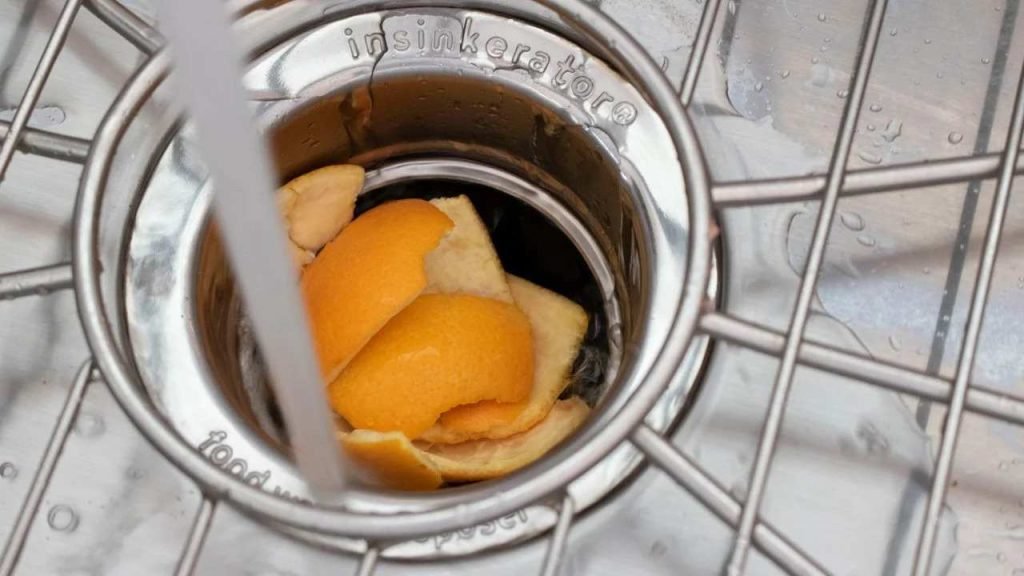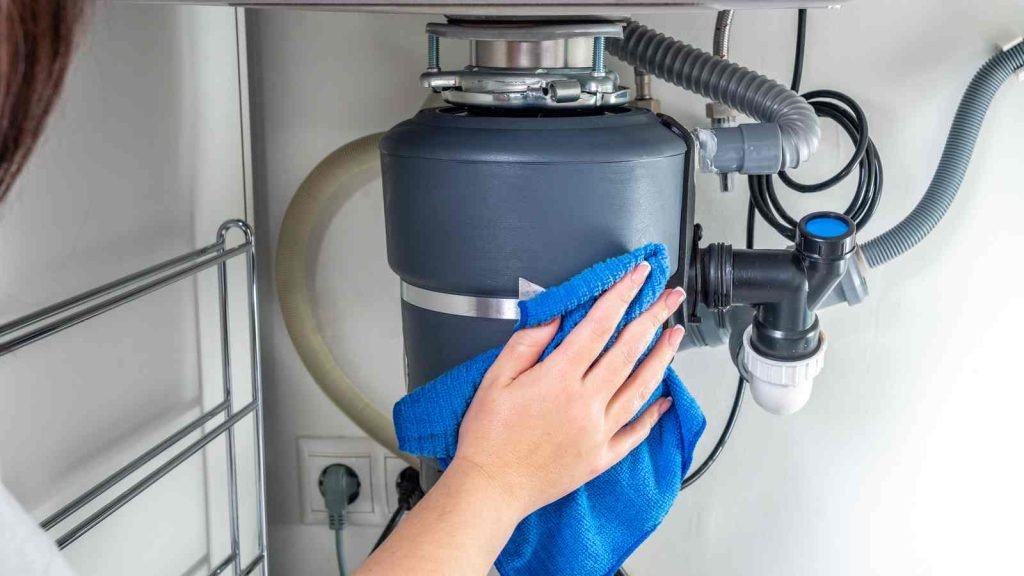Keeping garbage disposals clean in hard water areas can be challenging, with mineral build-up affecting performance and odor control. Over time, hard water leaves behind mineral deposits that clog the unit and reduce its efficiency. In this guide, The Pro Plumbing will cover the most effective methods to clean and maintain your garbage disposal, prevent hard water damage, and keep your kitchen smelling fresh. They will discuss everyday tips, easy solutions, and preventive measures to keep your disposal functioning at its best, even in hard water-prone areas. Read on to learn more about keeping your disposal in top shape.
How Hard Water Impacts Garbage Disposals
Hard water, high in minerals like calcium and magnesium, is known to leave behind mineral deposits that gradually accumulate within pipes and garbage disposal units. These deposits can restrict the disposal’s blades, reduce grinding efficiency, and create foul odors. Over time, hard water buildup can clog the unit, causing it to work harder and reducing its overall lifespan. Regular cleaning helps minimize these effects and allows the garbage disposal to function optimally. Understanding how hard water impacts garbage disposals can help you adopt effective cleaning methods to reduce the buildup and prevent possible damage to the unit.
Common Issues with Garbage Disposals in Hard Water Areas
Hard water often leads to several issues with garbage disposals, including mineral buildup, clogging, and unpleasant odors. Mineral buildup can restrict water flow, causing the disposal to operate less efficiently and leading to blockages over time. Furthermore, foul smells can arise when organic waste becomes trapped in mineral deposits. These problems are particularly challenging in areas with very hard water, where constant use causes faster accumulation. To address these issues effectively, it’s essential to implement cleaning practices specifically suited to hard water conditions, preventing both buildup and the need for more extensive repairs.
Effective Natural Cleaners for Hard Water Areas
Natural cleaners like vinegar, baking soda, and lemon juice are excellent for maintaining garbage disposals in hard water areas. Vinegar helps dissolve mineral deposits and deodorizes the unit, while baking soda acts as a gentle scrubber. When mixed, vinegar and baking soda create a fizzing reaction that breaks down stubborn buildup and neutralizes odors. Lemon juice offers a natural fresh scent and has mild acidic properties that work to prevent future mineral accumulation. Incorporating natural cleaners is a safe and eco-friendly way to keep your garbage disposal in top condition, particularly when dealing with hard water buildup.
How to Use Vinegar and Baking Soda for Effective Cleaning
Vinegar and baking soda make an excellent cleaning duo for garbage disposals affected by hard water. Start by pouring half a cup of baking soda into the disposal, followed by a cup of white vinegar. Allow the mixture to sit for 15-20 minutes, allowing it to dissolve any mineral buildup and loosen grime. After the waiting period, run hot water through the disposal to flush out any remaining debris. Repeat this process weekly to prevent hard water buildup and keep the disposal smelling fresh. Vinegar and baking soda are both natural and safe, making this method ideal for regular maintenance.
Using Ice and Salt to Keep Disposal Blades Sharp

Ice and salt are an effective combination for keeping garbage disposal blades sharp and free from mineral buildup. Add a handful of ice cubes and a tablespoon of rock salt to the disposal. Turn it on and allow the grinding action to pulverize the ice and salt, which helps to dislodge mineral deposits from the blades and inner surfaces. This method not only sharpens the blades but also removes buildup and odors, leaving the disposal functioning optimally. Using this technique once a month can maintain your disposal’s efficiency and prolong its lifespan, especially in hard water regions.
Preventing Mineral Buildup with Routine Maintenance
Routine maintenance is essential to prevent mineral buildup in garbage disposals located in hard water areas. Begin with regular flushing, using hot water and natural cleaners like vinegar. Additionally, avoid putting fibrous food waste, oils, and fats down the disposal, as these materials contribute to clogging and buildup. Using a soft-bristled brush to scrub the disposal’s rubber splash guard also helps remove grime. Routine cleaning reduces the frequency of mineral buildup, keeps blades sharper, and promotes a cleaner, odor-free kitchen. By integrating maintenance habits into your weekly cleaning routine, you can significantly extend the lifespan of your disposal.
Using Commercial Cleaners in Hard Water Regions
If natural cleaners aren’t providing the desired results, commercial cleaners specifically formulated for hard water areas may offer a stronger solution. These cleaners are designed to dissolve mineral deposits, remove grime, and neutralize odors without damaging your disposal. Look for products labeled as biodegradable or septic-safe to ensure they’re environmentally friendly. Apply commercial cleaners according to the manufacturer’s instructions to avoid overuse. Using a commercial cleaner every few months, in combination with natural methods, can keep your disposal free of hard water buildup and functioning well.
Tips to Prevent Odors in Hard Water Garbage Disposals
Odors can be a persistent problem for garbage disposals in hard water areas, as mineral buildup traps food particles and creates a breeding ground for bacteria. Regularly flushing the disposal with vinegar and lemon peels can help neutralize these odors. Additionally, using citrus peels and ice cubes in your disposal helps keep it fresh-smelling and free from lingering smells. Avoid disposing of items like oils and fat, which can worsen odor issues. By adopting odor-prevention techniques as part of your regular cleaning routine, you can enjoy a fresher kitchen without unpleasant disposal smells.
Benefits of Using Enzyme Cleaners in Hard Water Areas
Enzyme cleaners are a great option for homeowners looking for an effective yet gentle way to maintain garbage disposals in hard water areas. Enzymes break down organic waste and prevent clogs, making them ideal for odor control and mineral buildup prevention. Unlike harsh chemicals, enzyme cleaners are eco-friendly and non-toxic, making them safe for frequent use. They are especially beneficial for hard water areas because they help prevent deposits from accumulating on the blades and walls of the disposal. Regular use of enzyme cleaners can significantly reduce the need for more intensive cleaning measures.
DIY Descaling Solutions for Garbage Disposals

Descaling a garbage disposal in a hard water area is key to maintaining its efficiency. A DIY descaling solution using vinegar and water or a citric acid solution can help dissolve mineral buildup effectively. Pour half a cup of the solution into the disposal, allow it to sit for a few minutes, then flush with hot water. This process breaks down the hard water minerals clinging to the unit’s interior and prevents clogging. Performing this DIY descaling once every few months can ensure your garbage disposal remains free from hard water buildup and operates smoothly.
Preventive Measures to Keep Garbage Disposals Clean
Preventing issues before they arise is one of the best ways to manage a garbage disposal in hard water areas. Avoid grinding up fibrous foods, oils, and coffee grounds, as these can exacerbate buildup problems. Additionally, consider installing a water softener to reduce the mineral content of your water. Water softeners help prevent hard water buildup not only in garbage disposals but throughout your plumbing system. By combining regular maintenance with these preventive measures, you can ensure your disposal remains clean and odor-free while extending its lifespan.
FAQs
1. How often should I clean my garbage disposal in a hard water area?
It’s recommended to clean your garbage disposal at least once a week in hard water areas. Regular cleaning prevents mineral buildup and helps maintain efficiency. Using vinegar and baking soda weekly, along with a deeper cleaning with ice and salt monthly, can keep your disposal functioning smoothly.
2. Can hard water damage a garbage disposal?
Yes, hard water can damage a garbage disposal over time. The minerals in hard water cause buildup on the blades and walls of the disposal, reducing efficiency, creating clogs, and even leading to rust or other damage. Regular maintenance and descaling are key to preventing these issues.
3. Are natural cleaners safe for my garbage disposal?
Yes, natural cleaners like vinegar, baking soda, and lemon juice are safe and effective for garbage disposals. They help dissolve buildup and deodorize without causing damage to the unit. These cleaners are also eco-friendly and non-toxic, making them a safe choice for regular use.
4. How can I prevent hard water buildup in my garbage disposal?
You can prevent hard water buildup by regularly cleaning with vinegar and baking soda, flushing with hot water, and using ice and salt to keep blades sharp. Installing a water softener can also reduce the mineral content in your water, which can decrease buildup not only in your garbage disposal but throughout your plumbing system.
5. What are enzyme cleaners, and are they good for garbage disposals in hard water areas?
Enzyme cleaners contain natural enzymes that break down organic waste, helping to prevent odors and clogs. They’re non-toxic, eco-friendly, and gentle on disposal parts. Enzyme cleaners are especially beneficial in hard water areas because they help prevent buildup while controlling odor, making them a great addition to a regular cleaning routine.
6. How can I keep my garbage disposal smelling fresh?
To keep your garbage disposal fresh, try grinding citrus peels, such as lemon or orange, after each use. Vinegar and baking soda also help neutralize odors, and enzyme cleaners provide long-lasting odor control. Regularly flushing with hot water and avoiding the disposal of oils or fats also helps prevent odors.
Conclusion
Maintaining a garbage disposal in hard water areas requires consistent cleaning to avoid mineral buildup and unpleasant odors. By using natural methods like vinegar, baking soda, and lemon juice, or commercial and enzyme cleaners, you can keep your disposal running smoothly and smelling fresh. Ice and salt treatments and DIY descaling solutions also help prevent hard water-related issues. With a few preventive practices and regular maintenance, you can protect your disposal from damage and ensure a clean, efficient kitchen environment. By following these tips, you’ll extend the life of your garbage disposal and improve its overall performance in hard water conditions.

